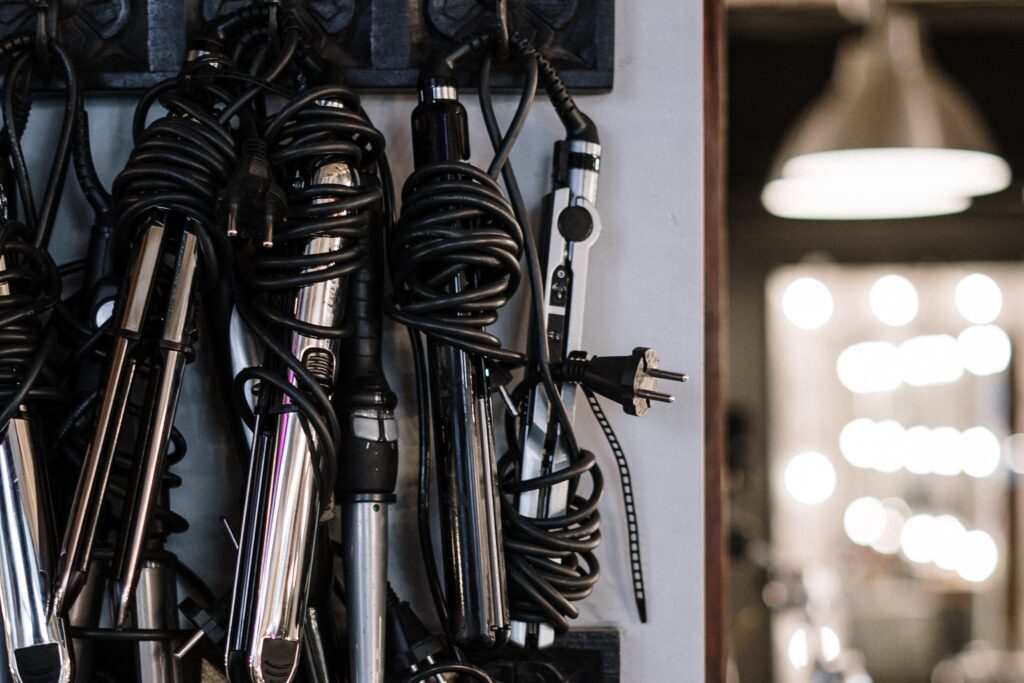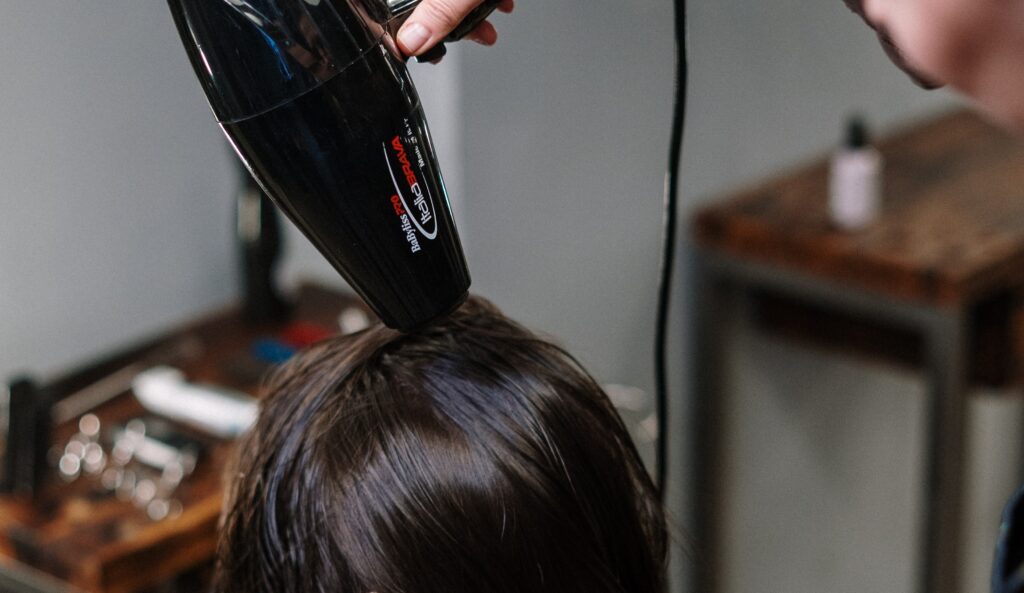Ionic hair dryers are all the rage these days, but some people are worried about whether they’re safe. Do ionic hair dryers cause cancer?
Ionic hair dryers have become increasingly popular in recent years, thanks to their ability to reduce frizz, speed up drying time, and leave hair smoother and more manageable. However, some people are concerned about the potential health risks associated with these devices. So, what’s the truth?
In this article, we’re going to figure out if hair dryers can cause cancer, talk about the benefits and risks of ionic hair dryers, and provide safety tips to help you make a good healthy decision. So be sure to read it to the end!
What are ionic hair dryers?
Imagine you’re in a hurry to get out the door, but your hair is still wet. You don’t have time to air dry it, so you reach for your ionic hair dryer.
Ionic hair dryers are a lifesaver for busy people. They use negative ions to break up water droplets, which helps your hair dry faster. They also reduce frizz and make your hair shinier.
But how do ionic hair dryers work? Inside the hair dryer, there’s a built-in ion generator. This generator creates negative ions, which are then released into the air stream as you blow dry your hair. The negative ions break up the water droplets on your hair into smaller molecules, which helps the water evaporate more quickly.
Ionic hair dryers are safe to use for all hair types, but it’s important to use the lowest heat setting possible and to hold the hair dryer at least 6 inches away from your hair to avoid heat damage.
Debunking the Claim: Do Ionic Hair Dryers Cause Cancer?
Have you ever wondered if your ionic hair dryer is giving you cancer? do ionic hair dryers cause cancer? It’s a common concern, but the good news is that there’s no scientific evidence to support it. Ionic hair dryers work by emitting negative ions, which break up water droplets into smaller molecules, which helps hair dry faster. They’re also said to reduce frizz and make hair shinier.
Some people have raised concerns that the negative ions emitted by ionic hair dryers may damage DNA and lead to cancer. However, there’s no evidence to support this claim. In fact, studies have shown that ionic hair dryers are safe to use and do not cause cancer. For example, one study looked at the risk of cancer in people who used ionic hair dryers for more than 20 hours per week for more than 10 years. The study found no increased risk of cancer in these people.
Another study looked at the risk of cancer in people who worked in hair salons, where they were exposed to ionic hair dryers on a regular basis. The study found no increased risk of cancer in these people either.
It’s important to note that all hair dryers emit some heat, and heat can damage hair. Therefore, it’s important to use the lowest heat setting possible and to hold the hair dryer at least 6 inches away from your hair to avoid heat damage.
Overall, there’s no evidence to suggest that ionic hair dryers cause cancer. Ionic hair dryers are safe to use, but it’s important to use them correctly to avoid heat damage to your hair. So, don’t be too much worried about “do ionic hair dryers cause cancer.”
So, if you’re a fan of ionic hair dryers, you can breathe a sigh of relief. There’s no need to ditch your trusty dryer just yet.

The Benefits of Ionic Hair Dryers
Ionic hair dryers are the bomb! They’re all the rage these days, and for good reason. They offer a number of benefits over traditional hair dryers, including:
- Faster drying time: Ionic hair dryers break down water droplets into smaller molecules, which helps hair dry faster. This is a lifesaver for people with thick or long hair, or for people who are always in a hurry.
- Reduced frizz and flyaways: Ionic hair dryers help to neutralize positive charges in the hair, which reduces frizz and flyaways. This is a blessing for people with dry or damaged hair, or for people who live in humid climates.
- Shinier hair: Ionic hair dryers help to seal the hair cuticle, which results in shinier hair. This is a must-have for anyone who wants to have healthy, radiant hair.
- Less heat damage: Ionic hair dryers can help to reduce heat damage to the hair. This is because they can dry hair faster at a lower temperature. This is great news for people who use heat styling tools on their hair on a regular basis.
Are ionic hair dryers harmful?
No, trust me Ionic hair dryers are not harmful, but they should be used safely. You will never ever have to worry about: do ionic hair dryers cause cancer or if it is harmful, If . . . . If you just use it properly and safely.
Here is a personal anecdote:
I used to be afraid of using an ionic hair dryer because I was worried about heat damage. But then I started using a heat protectant spray and the lowest heat setting possible. Now, I can’t imagine living without my ionic hair dryer! It helps me dry my hair so quickly and easily, and it makes my hair look and feel amazing. If you want to know more of the tips I have gathered for you, just keep reading.
Safety Tips for Using Ionic Hair Dryers
You will not have to wonder do ionic hair dryers cause cancer anymore, cause I am gonna give you the best tips you should know before using an Ionic hair dryer.
Ionic hair dryers are a great way to dry your hair quickly and reduce frizz. But it’s important to use them safely to avoid heat damage and other risks. So here are some tips I found while doing my research and some from my experience:
- Don’t scorch your hair! Ionic hair dryers are very effective at drying hair, even at lower heat settings. So turn down the heat, your hair will thank you for it.
- Keep your distance. Hold the hair dryer at least 6 inches away from your hair to prevent overheating.
- Move it around! Don’t hover the hair dryer in one spot for too long. Keep it moving to avoid burning your scalp.
- Protect your hair. Use a heat protectant spray before blow-drying your hair to minimize damage.
- Don’t use the hair dryer in the bathroom. The humidity can increase your risk of electric shock.
- Check your hair dryer regularly. If the cord is frayed or the plug is broken, don’t use it.
- Give your hair dryer a clean. Clean the air vents and filters regularly to prevent overheating.
- Don’t leave your hair dryer unattended. Turn it off and unplug it after each use.
- Be gentle with wet hair. Wet hair is more susceptible to heat damage than dry hair.
- Don’t blow dry your face. The heat can damage your eyes and skin.
- Don’t use the hair dryer if you have electrical implants. The electromagnetic field from the hair dryer can interfere with their functioning.
Here’s a bonus tip:
- Finish with a cold shot. Once your hair is dry, blast it with a cold shot of air. This will help seal the hair cuticle and reduce frizz ( I always do this).
Let Me Tell You – What is the safest type of hair dryer?
If you are still concerned about: do ionic hair dryers cause cancer, let me tell you more. No one wants to damage their hair with heat, so it’s important to choose a hair dryer that is designed to be gentle and effective, Right?
But do you know that the safest type of hair dryer is one that uses ceramic or ionic technology with multiple heat and air settings? Ceramic hair dryers distribute heat evenly throughout the hair shaft, which helps to prevent hot spots and damage. Ionic hair dryers emit negative ions, which break up water droplets into smaller molecules, which helps hair dry faster and reduces frizz.
It’s also important to choose a hair dryer with multiple heat and air settings so that you can customize the drying process to your hair type and needs. For example, if you have fine hair, you’ll want to use a lower heat setting to avoid over-drying your hair. If you have thick hair, you may need to use a higher heat setting to dry your hair thoroughly.

Can I use an ionic hair dryer every day?
Yes, you can use an ionic hair dryer every day, but the best way to decide how often to use an ionic hair dryer is to listen to your hair. If your hair is feeling dry or damaged, cut back on your use of the hair dryer.
When I didn’t know much about hair care, I just bought a hair dryer and used it daily. I also remember that I used to apply too much heat, which caused some minor damage to my hair. I had to stop using the dryer and purchase a serum on the advice of a super trendy friend, and I recovered in two weeks. I truly don’t want you guys to experience anything similar, so just keep in mind to pay attention to your hair and use hair serum.
Conclusion: Do ionic hair dryers cause cancer?
The good news is that there’s no scientific evidence to suggest that ionic hair dryers cause cancer. Ionic hair dryers work by emitting negative ions, which break up water droplets into smaller molecules, which helps hair dry faster and reduces frizz, that’s it.
Some people have raised concerns that the negative ions emitted by ionic hair dryers may damage DNA and lead to cancer. However, there is no evidence to support this claim, so you should not worry about it.
Don’t worry about myths without any research to support them. Ionic hair dryers are safe to use, as long as you follow the safety tips above in the article.
It is important to note that all hair dryers emit some heat, and heat can damage hair (it’s not gonna cause cancer). Therefore, it is important to use the lowest heat setting possible and to hold the hair dryer at least 6 inches away from your hair to avoid heat damage.
Hope you got your answer to: do ionic hair dryers cause cancer? Now I am done with my service, so . . . . can I get to know how was the explanation and everything in the article and If it was helpful or not? Just let me know whatever is on your mind right now I will be glad to hear how much helpful it was for you. Thanks!